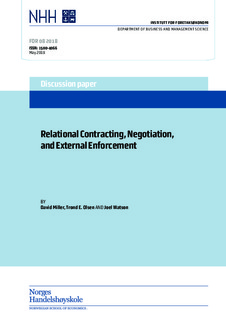| dc.description.abstract | We study relational contracting and renegotiation in environments with external enforcement of long-term contractual arrangements. An external, long-term contract governs the stage games the contracting parties will play in the future (depending on verifiable stage-game outcomes) until they renegotiate. In a contractual equilibrium, the parties choose their individual actions rationally, they jointly optimize when selecting a contract, and they take advantage of their relative bargaining power. Our main result is that in a wide variety of settings, in each period of a contractual equilibrium the parties agree to a semi-stationary external contract, with stationary terms for all future periods but special terms for the current period. In each period the parties renegotiate to this same external contract, effectively adjusting the terms only for the current period. For example, in a simple principal-agent model with a choice of costly monitoring technology, the optimal contract specifies mild monitoring for the current period but intense monitoring for future periods. Because the parties renegotiate in each new period, intense monitoring arises only off the equilibrium path after a failed renegotiation. | nb_NO |
